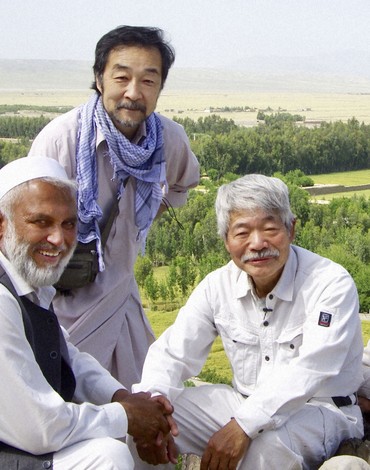TOKYO (Kyodo) — Before he was gunned down in Afghanistan in 2019 at the age of 73, Dr. Tetsu Nakamura had made up his mind to go to places where no one else was willing to go, but where help was desperately needed.
A documentary called “Lighting a Beacon of Hope in the Wilderness,” which traces Nakamura’s life and his dedication to providing humanitarian aid in Afghanistan and Pakistan before his death, is drawing unusually large domestic audiences.
Spreading organically through grassroots efforts, such as citizen-organized screenings, across Japan, the documentary surpassed 150,000 viewers within three years of its July 2022 release — a figure that is almost unheard of for a documentary. Some viewers have launched new initiatives to keep the doctor’s legacy alive.
The film chronicles Nakamura’s 35 years of overseas work, beginning with his assignment to a hospital in Peshawar, Pakistan, where he attended to leprosy patients. He then shifted his base to Afghanistan.
In 2000, amid a devastating drought that claimed many lives, including those of children who were victims of famine, Nakamura transformed deserted farmland into lush greenery through an irrigation canal construction project.
The same year he died, the Afghan government granted the Fukuoka native honorary citizenship. On December 4, 2019, he was fatally shot alongside his driver and security guards while en route to a work site by car.
The film was released in art house theaters nationwide, and independent screenings have been held at public facilities and other venues around Japan.
In the world of documentary films, a hit is defined as attracting over 10,000 viewers. The film, produced by Tokyo-based Nihon Denpa News Co., Ltd., reached 100,000 viewers in July 2024 and 150,000 viewers in July of this year. Approximately 70 percent of the viewers attended independent screenings, and the film has been released in every prefecture.
In Ueda, in central Japan’s Nagano Prefecture, citizens put up posters and requested sponsorship from the local government. As a result, some 1,300 people attended the event.
Sato Oishi, the 76-year-old chair of the event organizing committee, said, “Many people were in tears after the screening. Some even expressed a desire to hold screenings in their own towns next.”

Tetsu Nakamura, far left, is pictured smiling with Afghans in a scene from the film “Lighting a Beacon of Hope in the Wilderness.” (Photo courtesy of Nihon Denpa News Co., Ltd./Kyodo)
A Japanese national who runs a Japanese-language school in Yangon, Myanmar’s largest city, requested a screening of the film, which was attended by over 300 young people aspiring to become technical interns in Japan.
Activities to pass on the legacy of Nakamura’s achievements are also expanding. In April of this year, a musical drama called “The Meaning of Life,” based on Nakamura, was staged in Tokyo.
Tomohiko Nakai, 41, who wrote the screenplay and directed the musical, said, “After watching the film, I wanted to express how Mr. Nakamura lived his life as a man who was trusted.”

This photo shows a scene from a musical about Tetsu Nakamura performed in Tokyo in April 2025. (Kyodo)
A performance is also scheduled for next January in Asakura, Fukuoka Prefecture, in southwestern Japan. Asakura is home to the historic Yamada Weir, which transports water from the Chikugo River to the surrounding rice fields. The Yamada Weir served as a model for Afghanistan’s irrigation canal construction.
Masato Yamada, a 64-year-old TV personality and actor known for his sketches recreating events and people’s lives, watched the film repeatedly while preparing to feature Nakamura.
“Without this film, I couldn’t grasp the immense challenges he faced in undertaking this project nor the expressions of joy on people’s faces when the irrigation canals were completed. Unable to visit the site myself, I learned about it through the film.”
Kenji Yatsu, a 64-year-old director at Nihon Denpa News who filmed Nakamura for over 20 years and directed films about him, said, “It is precisely because the world is unstable now that people are moved by Dr. Nakamura, who demonstrated the innate conscience inherent in humanity. I would be delighted if everyone could share the impressions they gained from watching the film in whatever way they can.”
(By Takahiro Yamagami)


AloJapan.com